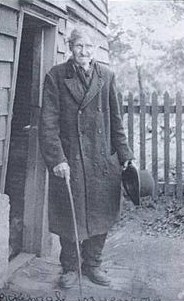George Pickingill
George Pickingill (1816–1909) was an English cunning man and folk magician who became a prominent figure in the history of witchcraft and paganism in the late 19th and early 20th centuries. He is often associated with the modern witchcraft movement and has been the subject of various legends and folklore.
Early Life[edit | edit source]
George Pickingill was born in the village of Hockley in Essex, England, in 1816. Little is known about his early life, but he came from a family with a long tradition of folk magic and cunning folk practices.
Career as a Cunning Man[edit | edit source]
Pickingill gained a reputation as a powerful cunning man and was known for his skills in healing, divination, and spell casting. He was said to have a deep knowledge of herbalism and folk remedies, which he used to help the local community. His services were sought after by people from various walks of life, including farmers, laborers, and even members of the gentry.
The Nine Covens[edit | edit source]
One of the most enduring legends about George Pickingill is his association with the "Nine Covens." According to folklore, Pickingill was the leader of nine covens of witches spread across East Anglia. These covens were said to practice a form of witchcraft that predated the Gardnerian and Alexandrian traditions. The existence of these covens and Pickingill's role in them has been a topic of much debate among historians and researchers of modern paganism.
Influence on Modern Witchcraft[edit | edit source]
George Pickingill is often credited with influencing the development of modern witchcraft and paganism. Some believe that his teachings and practices were passed down through generations and eventually influenced figures like Gerald Gardner, the founder of Gardnerian Wicca. However, there is little concrete evidence to support these claims, and much of what is known about Pickingill comes from oral tradition and folklore.
Death and Legacy[edit | edit source]
George Pickingill died in 1909 in Canewdon, Essex, a village also steeped in witchcraft lore. His legacy continues to be a subject of interest and debate among scholars and practitioners of modern witchcraft and paganism. While some view him as a key figure in the history of witchcraft, others see him as a folkloric character whose life has been embellished over time.
See Also[edit | edit source]
- Cunning folk
- Folk magic
- Witchcraft
- Paganism
- Gerald Gardner (Wiccan)
- Gardnerian Wicca
- Alexandrian Wicca
References[edit | edit source]
External Links[edit | edit source]
Search WikiMD
Ad.Tired of being Overweight? Try W8MD's physician weight loss program.
Semaglutide (Ozempic / Wegovy and Tirzepatide (Mounjaro / Zepbound) available.
Advertise on WikiMD
|
WikiMD's Wellness Encyclopedia |
| Let Food Be Thy Medicine Medicine Thy Food - Hippocrates |
Translate this page: - East Asian
中文,
日本,
한국어,
South Asian
हिन्दी,
தமிழ்,
తెలుగు,
Urdu,
ಕನ್ನಡ,
Southeast Asian
Indonesian,
Vietnamese,
Thai,
မြန်မာဘာသာ,
বাংলা
European
español,
Deutsch,
français,
Greek,
português do Brasil,
polski,
română,
русский,
Nederlands,
norsk,
svenska,
suomi,
Italian
Middle Eastern & African
عربى,
Turkish,
Persian,
Hebrew,
Afrikaans,
isiZulu,
Kiswahili,
Other
Bulgarian,
Hungarian,
Czech,
Swedish,
മലയാളം,
मराठी,
ਪੰਜਾਬੀ,
ગુજરાતી,
Portuguese,
Ukrainian
Medical Disclaimer: WikiMD is not a substitute for professional medical advice. The information on WikiMD is provided as an information resource only, may be incorrect, outdated or misleading, and is not to be used or relied on for any diagnostic or treatment purposes. Please consult your health care provider before making any healthcare decisions or for guidance about a specific medical condition. WikiMD expressly disclaims responsibility, and shall have no liability, for any damages, loss, injury, or liability whatsoever suffered as a result of your reliance on the information contained in this site. By visiting this site you agree to the foregoing terms and conditions, which may from time to time be changed or supplemented by WikiMD. If you do not agree to the foregoing terms and conditions, you should not enter or use this site. See full disclaimer.
Credits:Most images are courtesy of Wikimedia commons, and templates Wikipedia, licensed under CC BY SA or similar.
Contributors: Prab R. Tumpati, MD

